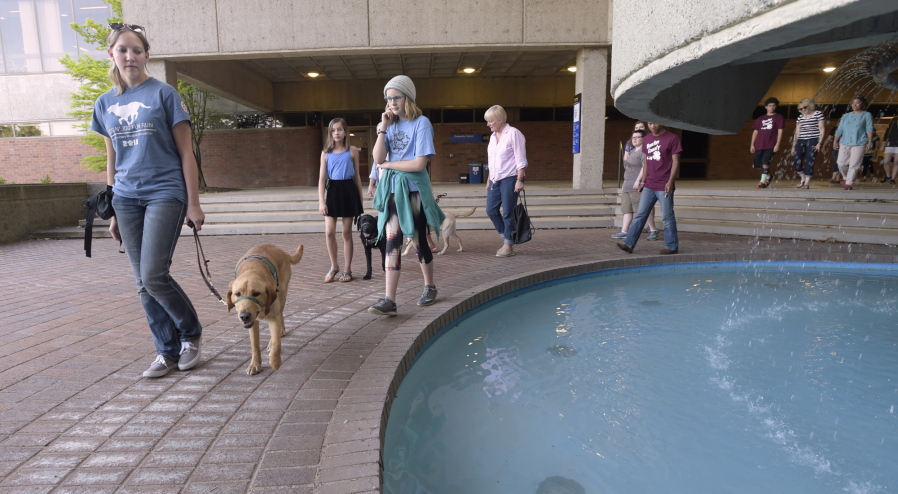ALBANY, Ore. — From the second floor, Clarita took in the stairwell at Linn-Benton Community College: its shadowed steps, the boom of voices echoing off the brick walls.
Then she trotted confidently down, tail wagging as she accepted a kibble treat from her walker, Julia Marsh, 11, of Albany.
Stairways, fountains, even a ride in an elevator: nothing fazed the three puppies who spent an evening April 19 at the community college practicing their skills to be Guide Dogs for the Blind, the Albany Democrat-Herald reported.
Members of Eyeraisers, a Benton County-based 4-H club connected with Guide Dogs for the Blind, take regular field trips to expose their pups to new situations.
On this particular day, Clarita, a 6-month-old yellow Lab, visited LBCC with Mycroft, a 9-month-old yellow Lab, and Vale, a 6-month-old black Lab.
The club’s human members took turns walking the pups down the halls and through the courtyards, cruising along the second-floor railings to make sure no one had a problem with vertigo.
“Everybody came down the noisy stairs fine? Didn’t bother anybody?” asked Penny Steele, the Eyeraisers’ leader. “Awesome!”
All three dogs took nearly everything in stride. Their only difficulty was ignoring the three younger siblings who’d come along for the trip. The boys’ job was to try to distract the dogs with calls and attempts to pet them, and it was hard to resist the temptation for human attention.
They’ll learn, Steele said. They’ll have to, to one day lead a blind person safely through the obstacles of his or her life.
Eyeraisers accepts youths from both Linn and Benton counties, as long as they are at least 9 years old and in the fourth grade. But members can be older: One of the walkers at the community college was Meghan Knettle, 19, an Oregon State University student studying animal science.
Travis Hinz, 16, of Corvallis has been working with dogs since age 8 and is now a junior leader with the club. He has raised at least nine dogs so far and is currently co-raising Vale with Steele.
Hinz was looking for a community service project when he came across the club. He has had eyesight trouble himself and decided he wanted to help other people who might need an extra pair of eyes.
The thought of being able to do so is what keeps him coming back.
“At graduation, we hand over the leash to the blind person,” he said. “Each time I do that, it’s like, wow — this dog is really changing this person’s life.”
Elizabeth Beck, 13, of Scio is one of two club members slated to receive a new puppy to raise on May 25 (Julia is the other). Her dog, who will be 8 to 10 weeks old, will arrive that day from the Guide Dogs for the Blind kennels in San Rafael, California.
Elizabeth joined the club a couple of months ago and has been working hard to meet all the requirements for raising a dog: coming to meetings regularly, reading the puppy manual, puppy-sitting for five days and having Steele come do a home inspection.
“My mom raised guide dogs a long time ago, and I really wanted a puppy,” Elizabeth explained. But with two dogs already living with the family, her father wasn’t on board with the idea.
Elizabeth worked up a report on the value of guide dogs and gave her father a formal presentation. “I convinced him,” she said.
Elizabeth said she’s hoping to use the skills she gains with the club to train the two dogs they have already, but she knows things are different with a guide dog.
For one thing, they have to be able to pee and poop on command, and they have to be OK with doing that on pavement, because a blind person can’t always seek out a patch of grass. For another, they have to be calm and on task even in stressful situations, “like at a fair, where people are yelling and screaming and there’s ice cream on the ground.”
“It’s not as hard as it looks,” Elizabeth added. “You’re in a really supportive group and they can help you whenever you could possibly need it.”
Eyeraiser members don’t have to raise a dog to belong to the club, Steele said, and even the ones who do don’t necessarily have a dog full time. Some co-raise dogs with other members, while others are dog “starters” who have the puppies when they are very young and then transfer them to another member. Still others just puppy-sit when a raiser can’t be home.
Steele has been raising dogs since 2005 and leading the group since last year.
“It is probably the hardest and best thing I do,” she said. “I immediately fall madly in love with that puppy, work with it, play with it, worry about it and then I have to say good-bye. But I can do that because I know that puppy is going on to make such a huge difference in someone’s life.”
Steele said she’s proud to help the process for Guide Dogs for the Blind, which does all of the training and pays for all the health care for its dogs at no cost to the blind partner.
“That puppy teaches me so much about love, and giving, and commitment and to be working with a great group of people who love dogs and people enough to do (it),” she said. “It’s just the best thing.”



